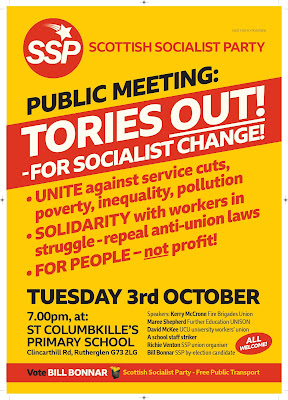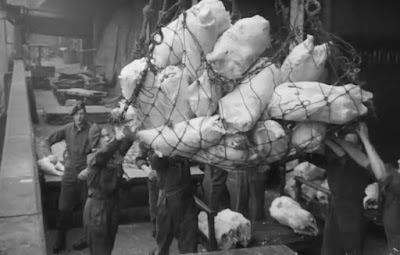Labour
leaders Sir Keir Starmer and Anas Sarwar are waxing lyrical about the result of
last night’s Rutherglen & Hamilton West by-election being ‘seismic’; proof
of the looming certainty of Labour sweeping into government; an indication that
people see the need for ‘a fresh start’ and that they’ve entrusted Labour as
the party to bring about ‘change’ from the ‘incompetence, inefficiency, and
divisiveness of two governments’ – Tory and SNP.
A sense of
proportion is important in politics, and above all a willingness to dig beneath
the surface of things.
There is no
denying Labour crushed the SNP in the vote – winning a 58% share of votes cast,
compared with the SNP’s 27%. Undeniably, that is a huge turnaround from the
voting shares in the 2019 general election in this seat, when the SNP won with
44% of all votes cast, against Labour’s 34% share.
Polarised
Vote Between Labour and SNP
We predicted
a massive polarisation and crushing predominance in votes between Labour and
SNP, in a battleground that could help determine the fate of both Labour
leaders and Humza Yousaf - which would crush and squeeze other parties,
including the SSP. On the day, Labour
and SNP votes combined accounts for 85.3% of the total votes cast!
But despite
the superficial talk of ‘a 20% swing from the SNP to Labour’ – heralding a
Labour government next year, with at least 20 seats gained by Labour in
Scotland - this vote was no ringing endorsement of Starmer’s right-wing Labour.
Labour’s
vote actually fell by 700 since 2019. And the most crushing indictment of what
is on offer to working-class voters from the major, ‘mainstream’,
pro-capitalist parties is that a derisory 37% of registered voters turned out
to vote – a catastrophic collapse from a 66.5% turnout in December 2019.
People were
clearly sending out the message ‘a plague on all your houses’, ‘we’re fed up
with the lot of you’.
Catastrophic
Collapse for SNP
Chief
victims of the consequences of this widespread voter disgust are the SNP –
whose vote collapsed from nearly 24,000 to 8,399! That has huge repercussions
for Humza Yousaf and the SNP.
Voter
desertion from the SNP was undoubtedly driven – amongst a few factors – by
anger at the Covid rule-breaking by former SNP MP Margaret Ferrier. Despite
being chucked out of the SNP by Nicola Sturgeon on discovery of her cavalier
breach of Covid rules, and sitting as an Independent MP since, Ferrier was
still widely regarded as linked with the SNP – with not just the necessary 10%
of the electorate but 15% of them turning out in July, photographic ID in hand,
to cast their vote in the Recall Petition, triggering the by-election.
In tandem
with that, we witnessed widespread, often scathing criticism of the SNP, in
part driven by unionist media vilification, but more importantly by the lived
experiences of thousands of people who feel bitterly let down and disillusioned
with the SNP in government – compounded by the crises surrounding the police
inquiries into their financial affairs, and the unprecedented divisions on
display during the recent SNP leadership contest.
Workers’
Collective Action puts SNP on the Spot
In my
opinion, underpinning all these factors is the eruption of workers’ collective
conflict with the SNP/Scottish Green Party government, in several sectors such
as FE colleges, schools, local government generally, the fire service, and
previously on the railways – in stark contrast to previous years when they got
away with appearing to be ‘all things to all classes, workers and employers
alike’, during a period of very low levels of class struggle.
Now they’ve
been put on the spot in wage struggles, trade union action on jobs and public
services – leading to the frequent comments we encountered in the by-election
along the lines “the SNP have had their chance, now I’m voting Labour.”
Tory
Votes Collapsed into Labour
However,
superficial commentary on ‘a 20% swing from the SNP to Labour’ misses another
key factor; the Tory vote collapsed, catastrophically, from over 8,000 in 2019
to 1,192. And we have plenty of anecdotal evidence that many of them didn’t
just stay at home but turned out to vote Labour “to get the bloody SNP out”, as
more than one of them said to us.
Likewise,
Labour will have gained some ex-LibDem votes, given the latter’s vote plummeted
from 2,791 to 895.
No
Enthusiasm for Labour
Above all,
people abstained en masse, with a mere 37% turnout, down from 66.5% in 2019! So,
no ringing endorsement of Starmer's and Sarwar's Labour; there was no
enthusiasm for Labour on the ground, and even many who voted for them on the
day told us of their contempt for what Starmer represents.
Yes, this
by-election result reinforces the likelihood of a Labour government next year –
primarily as a backlash against the corruption, incompetence, and class cruelty
of the Tories. But the great advantage of the by-election - and in particular
our courageous decision to stand an SSP candidate despite our accurate predictions
of a polarised domination of the voting between Labour and SNP - is that it has
helped unmask Labour in the eyes of thousands of people, including many who
voted Labour whilst ‘holding their nose’ at the stench of betrayal emanating
from Starmer’s weekly retreats on policies.
Change?
No Change!
Starmer,
Dame Jackie Baillie, and their tame parrot, Michael Shanks, trotted out clichés
about the ‘need for change’ and ‘a fresh start’. But in the same breath they effectively
warned people not to get their hopes up of either change or anything resembling
a fresh start under a Labour government!
Despite our
modest resources, the SSP played an invaluable and very incisive role in
exposing Labour’s act of ‘getting their betrayal in first’, long before being elected.
SSP
Exposed Labour’s Continuity Tories
We denounced
– on street meetings, in leaflets, and press statements – their escalating
reversal of previous promises: to abolish the bedroom tax; scrap the vicious two-child
benefits cap and its attendant rape clause; ban all zero hours contracts; levy a
wealth tax on the rich; take any action on climate change that differs from the
Tories, such as stopping the 100+ new licences to tax-dodging Big Oil to plunder
and pollute in the North Sea for profit.
We exposed their
refusal to promise a £15 minimum wage; their refusal to breach Tory public
spending limits and branded them as ‘the Continuity Tories’ – a phrase on our
street meetings and leaflets which caught a lot of attention.
SSP Under
a Labour Government
This was an important
preparation for the role the SSP will have to play if or when Labour wins next
year’s general election; warning working-class people of their capitalist
politics, their support for the same rotten poverty, inequality, exploitation,
and pollution as we’ve suffered under years of Tory rule. And more importantly
still, popularising a genuine, hard-hitting, socialist alternative.
SSP Vote
As we expected
and predicted, the SSP – along with all other parties and candidates – was
squeezed by the polarised binary battle between Labour and the SNP, in the
entirely undemocratic, unrepresentative Westminster First Past the Post voting
system.
We lost
count of the people who said, “I agree with what you’re saying, but you’re not
going to win”. Unfortunately, they proceeded to waste their votes on either Labour
or the SNP, sometimes despite believing that would indeed lead to ‘no change’.
We came a
respectable 8th out of 14 candidates. We had to fight ferociously for every
vote, and for every column inch in the media.
I will leave
a fuller account of our outstanding campaign for a further article. For now, suffice
to say we probably had more local activists campaigning than the victorious
Labour – who mostly relied on MPs, MSPs, councillors, and hired party staffers
to swamp the area. They came from all over Britain – including at least as far
afield as London, the Midlands, and Cornwall!
Vibrant
SSP Campaign
We were the
only party to hold countless street stalls and street meetings at least twice a
week, often simultaneously in two or three of the four towns.
We had two
brilliant public events: a night of film and music, featuring the oft banned
“Oh, Jeremy Corbyn! The Big Lie”, exposing the conscious sabotage of Corbyn’s
election prospects by Starmer and the right-wing Labour machine; and an
inspiring SSP public meeting, with speakers from the FE Unison strikes,
University strikes, Fire Brigades Union, SSP candidate Bill Bonnar, and myself.
Both were
regarded by SSP members and totally new people in attendance as one of the best
events they could remember, adding several recruits to the SSP on top of those
who’d already joined us in the three months of campaigning prior to then.
On the day,
we came 8th out of 14 candidates.
Another tiny
group on the left – who we asked to stand aside in favour of giving the SSP a
free run in a constituency where our party has a history of activity for the
past 25 years, including contesting parliamentary and council elections at least
12 different times, and where they have literally never stood before – added some confusion amongst voters attracted
to a socialist alternative.
Whilst the
SSP got about 160% as many votes as them, the pity is that our combined votes
would have put us in at least 6th place, beating the two reactionary
parties, Reform (ex-UKIP) and Family Party.
Indeed, if
they hadn’t indulged in such a sectarian act, the vote for the well-established
SSP would have been even greater than the sum of the two divided parts, as I
asked them to recognise when we met to try and get them to stand aside.
Popularising
Socialism; Building the SSP
Our vote was
never the prime criterion for us standing. We popularised a socialist
alternative on the streets, had two brilliant public events, recruited large
numbers of quality new members, helped train many members in the battle, and got
a lot of very hard-earned press coverage. The SSP’s profile has been enhanced
immensely.
Despite our
modest vote, the campaign was a great success. It lays firm foundations for the
future role of the SSP, as the growing socialist opposition to a mercilessly
right-wing, pro-capitalist Labour government in the year or so ahead.
It took
great courage, and bucketloads of vision and dedication, to put up a socialist
challenge in the specific circumstances of this by-election; we can be proud of
all the SSP members and future members who waged this relentless socialist
campaign for nearly four months.






























